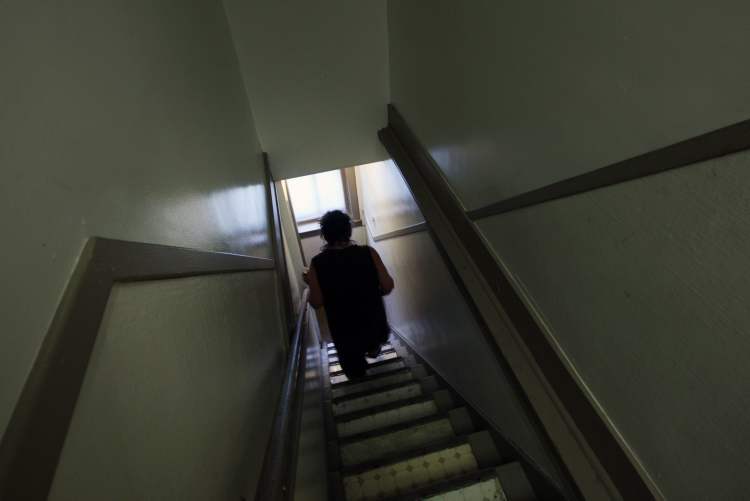Big bankers blamed for keeping poor out of rooming houses
Landlord says refusal to give mortgages a key issue
Advertisement
Read this article for free:
or
Already have an account? Log in here »
To continue reading, please subscribe:
Monthly Digital Subscription
$1 per week for 24 weeks*
- Enjoy unlimited reading on winnipegfreepress.com
- Read the E-Edition, our digital replica newspaper
- Access News Break, our award-winning app
- Play interactive puzzles
*Billed as $4.00 plus GST every four weeks. After 24 weeks, price increases to the regular rate of $19.00 plus GST every four weeks. Offer available to new and qualified returning subscribers only. Cancel any time.
Monthly Digital Subscription
$4.75/week*
- Enjoy unlimited reading on winnipegfreepress.com
- Read the E-Edition, our digital replica newspaper
- Access News Break, our award-winning app
- Play interactive puzzles
*Billed as $19 plus GST every four weeks. Cancel any time.
To continue reading, please subscribe:
Add Winnipeg Free Press access to your Brandon Sun subscription for only
$1 for the first 4 weeks*
*$1 will be added to your next bill. After your 4 weeks access is complete your rate will increase by $0.00 a X percent off the regular rate.
Read unlimited articles for free today:
or
Already have an account? Log in here »
Hey there, time traveller!
This article was published 18/07/2013 (4462 days ago), so information in it may no longer be current.
It’s nearly impossible to get a mortgage to buy a rooming house in Winnipeg, making it unlikely a landlord can do anything but flip his property into something too fancy for most poor people.
It’s a financial catch-22 that has put the squeeze on what’s already Winnipeg’s most marginal form of housing, short of a bed at Siloam Mission.
Little more than a year ago, West Broadway landlord Steve Tait tried to buy an established rooming house on Furby Street but, when he applied for a mortgage, he was turned down by his own TD Bank and Assiniboine Credit Union, a socially conscious financial institution.

Gerry Campbell, Assiniboine’s executive vice-president of sales and service, said the credit union holds fewer than 10 mortgages on rooming houses.
“We are very selective,” he said.
Assiniboine will only approve a mortgage on a rooming house if the borrower has proven management ability, is a local resident and demonstrates a willingness to invest in and maintain decent housing for low-income people.
“We don’t want to be caught where people are being exploited,” said Campbell.
Not long ago, Assiniboine financed a building of multiple single apartments only to find the owner had turned it into an illegal rooming house. Assiniboine was forced to take possession. Selling rundown rooming houses that were foreclosed on is difficult, he said.
Rooming houses fall through the cracks of government rules meant for apartments or single-family houses. They are regulated, licensed and inspected by different civic and provincial departments, none of which agree on what constitutes a rooming house or how many there are in the city.
Housing advocates say rooming houses are disappearing — Spence has lost 20 per cent in the last decade — as property prices rise and flipping becomes more attractive.
Mortgage restrictions don’t help, making it tough for good landlords to reinvest in aging houses, and less likely a slum landlord might sell to a good one. In the end, Tait managed to finagle financing from Crosstown Credit Union, the same lender that worked with the former owner of the Furby Street house. Crosstown agreed to the mortgage only because it was familiar with the property and had previously mortgaged it.
Tait had to put 30 per cent down. His interest rate was well above what a homeowner in Linden Woods might pay, and the amortization period was halved. He must pay down the mortgage in 12 years instead of 20 or 25, meaning he barely breaks even now and has little to reinvest in the property.
‘We don’t want to be caught where people are being exploited’
The Furby Street house needs new front stairs. The bathrooms would work better with showers instead of old cast-iron bathtubs and the windows need to be replaced. Tait could easily do $50,000 worth of work on the house — which has already been spruced up considerably with the help of the West Broadway Community Organization — but the mortgage curbs cash flow.
Crosstown has said it is not interested in financing any other rooming houses.
Meanwhile, Tait said he gets irritated when he sees senior bank executives attend galas and pledge to fight poverty while making it impossible for the market to support low-income housing.
“What frustrates me is, all these guys pat each other on the back and say ‘We’re going to end homelessness,’ ” and then when the rubber hits the road they head for the hills,” said Tait.
maryagnes.welch@freepress.mb.ca
History
Updated on Thursday, July 18, 2013 7:44 AM CDT: Replaces photo, fixes pull quote









